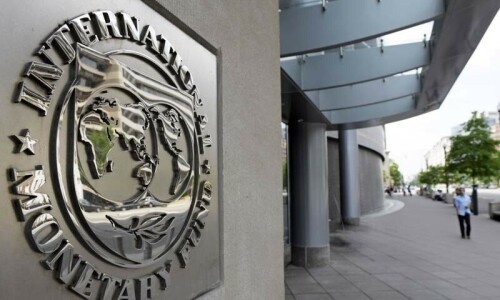 KARACHI, Dec 26: A huge oil tanker overturned on Shahrah-i-Attar in Clifton on Friday, spilling 44,000 litres of petrol and crushing a car under it. The petrol was diverted into the drains that lead into the Arabian sea, a move that is likely to have grave environmental repercussions.
KARACHI, Dec 26: A huge oil tanker overturned on Shahrah-i-Attar in Clifton on Friday, spilling 44,000 litres of petrol and crushing a car under it. The petrol was diverted into the drains that lead into the Arabian sea, a move that is likely to have grave environmental repercussions.
The occupant of the crushed car (AJA-477) had a miraculous escape. The driver of the tanker fled following the accident.
DIG Traffic Wajid Ali Khan Durrani told Dawn that the accident occurred even though there was currently a ban on the movement of heavy vehicles in the city limits from 7am to 11pm.
The survivor, identified as Yasir Siddiqui by the police, works at a bank located nearby.
“Mr Siddiqui walked back to his office, informing those present of his miraculous escape,” said a police officer who was collecting information at the scene.
“The tanker (LSA-7454) began its journey at the Keamari Oil Installation area and was headed for filling stations located in the interior of Sindh,” said Clifton SP Azad Khan.
The consignment was being transported by a private contractor.
The tanker was forced to take a detour through Shahrah-i-Attar, as the Bilawal House road was blocked, an official confided to Dawn.
As the accident occurred adjacent to the shrine of Abdullah Shah Ghazi, petrol began to leak from the tanker towards the sea. It was then diverted into an open drain that runs parallel to the road.
The smell of petrol filled the area, and law-enforcement personnel cordoned off parts of the road.
“A minor act of negligence could trigger another accident, as unlike the crude oil spilled in Korangi, this petrol is highly inflammable,” noted Chief Fire Officer Saleem Ehtisham.
Fire engines were used to douse the petrol with foam, in order to lessen the risk of fire.
Speculating on how the accident occurred, inquiry officer Mohammad Javed told Dawn that the oil tanker was in the left lane of the road and was negotiating the ramp close to the Abdullah Shah Ghazi shrine.
“It appears that some vehicle came from the left side of the tanker (from the service road), which forced the tanker’s driver to apply the brakes and turn to the right. With the weight of 44,000 litres of petrol, however, the tanker overturned and the front of it fell on the car in the right lane,” Mr Javed observed.
Following the accident, rescue personnel and the chief fire officer were under the impression that only 22,000 litres of petrol had been lost, as the tank was divided into two chambers.
Believing that the remaining half of the consignment was still in the tanker, trucks brought sand to the scene, which was then dumped on the leaking petrol.
Officials then brainstormed as to how to pump the remaining petrol out of the tanker without causing another accident. It was only when the contractors appeared on the scene several hours later that it became clear that all 44,000 litres had been lost and that the tank was empty.
The accident occurred at around 2pm and by 6pm the salvage operation was completed when two cranes lifted the wreckage away. Finally, the crushed Suzuki Cultus was also lifted.
The police registered a case (FIR 564/2008) on behalf of the state against the tanker driver under Sections 279 (rash driving or riding on a public way) and 427 (mischief causing damage to the amount of fifty rupees) of the Pakistan Penal Code at the Boat Basin police station. Significantly, the environmental degradation section of the penal code was not invoked by the police.
Marine life at risk
Environmentalists fear that if the oil reaches the sea, it will float at the top of the water, killing plankton and fish.
Former director-general of the Sindh Environmental Protection Agency Dr Iqbal Saeed Khan said the petrol may cause harm to organisms that float on the surface of the water, such as sea birds, seaweed and plankton (and plankton-like animals). He added that marine life which comes to the surface to breathe will be coated with oil.
“The oil will form a film over the sea water, preventing the entry of oxygen from the air into the water. As such, it causes a grave risk to plants and fish,” he said. He also noted that the refraction of sunlight, which is necessary for the maintenance of sea water temperature and photosynthesis in marine flora, may not occur as it should because of the film.
Dr Khan went on to assert that the petrol will injure the gills of fish, compromising their respiratory systems. He urged the authorities to quickly ensure that the oil does not reach the sea through the drains. If that can not be done, he suggested the authorities make every effort to mitigate the toxic effects of the oil by using booms and dispersant to pull the oil back.









































Dear visitor, the comments section is undergoing an overhaul and will return soon.